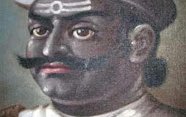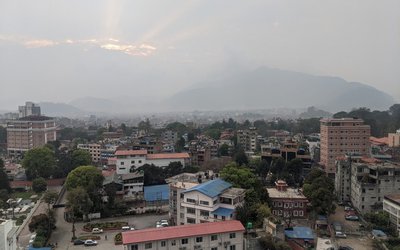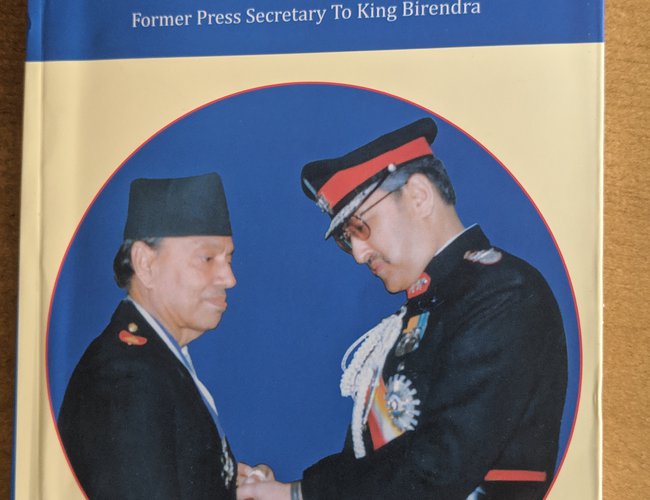
Many persons served in Royal Palace during the reign of late King Birendra but only a few have published a book based on their personal conversation with him. Late Narendra Raj Pandey’s recently published book King Birendra-As I Knew Him is a book which narrates the conversations with King late Birendra honestly.
Having served in the Royal Palace Secretariat in different capabilities and positions before retiring as Principal Secretary, late Pandey’s integrity and honesty are unmatched. Although his junior brother Dr. Devendra Raj Pandey, who stood against monarchy for long, no one questions Pandey’s faith and integrity towards monarchy.
Like his elder brother Dr. Mrigendra Raj Pandey and junior brother Dr. Devendra Raj Pandey, former ambassador to People’s Republic of China Narendra Raj Pandey has maintained the family’s decorum to speak honestly whether somebody likes or dislikes it.
This is what one can find in the off-the-record conversations with late King Birendra in the recently published book on King Birendra. Although Nepal has been declared as having moved from monarchy to a republican system, the views of King late Birendra compiled in the book will be very useful to understand Nepal and Nepal’s issues.
“Late Narendra Raj Panday's book: King Birendra - As I Knew Him is in an unusual style proving interesting insights. A section on Birendra’s Off-the-Cuff Observations is fascinating and relevant even today forcing me to be surprised to find my 20-year old comments! In his second tweet, Gyawali said late Narendra Raj Pandey's book King Birendra - as I Knew Him has a chapter on "Birendra's Off-the-Cuff Observations" like Dibya Upadesh 2. Read it.”
After late Birendra’s Guru of Harvard University, professor Francis G. Hutchins, who described late Birendra as Dbhruva, Pole star. Professor Hutchins, in his book Democratizing Monarch, a memoir of Nepal’s King’s Birendra, writes, “Like Dhruva, Birendra seems certain to remain a fixed point of reference.” As the pole star, Dhruva is also called Graha-dhara, pivot of the planets, to which the pole star is thought to be linked by invisible strands of nurturing influence.”
Late Narendra Raj Pandey’s book proves it, for example, Dipak Gyawali’s tweets back Professor Hutchins and late Pandey that King late Birendra was genuine. Even after fifteen years of his death, there are so many relevancies on his opinion. As King late Birendra, late Pandey’s honesty, integrity and punctuality will be remembered through the book. We have decided to reproduce some important components of the book.
As Nepal is celebrating seventeen years of death of King Birendra, this book reveals many personal opinions.
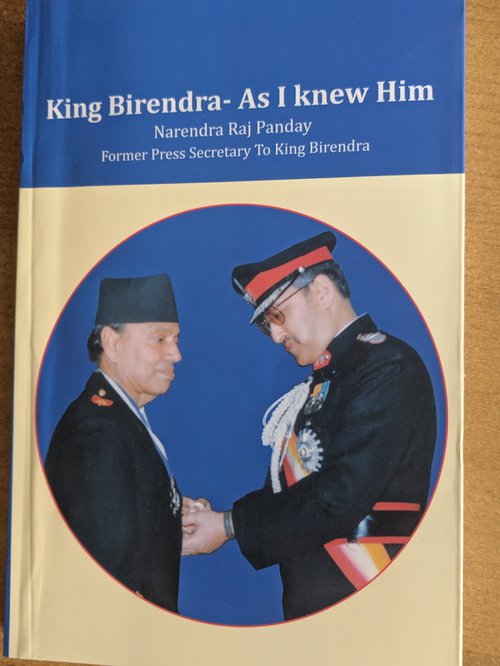
Name of the book: King Birendra-As I Knew Him
By Narendra Raj Panday
Publsihed By Nalini Panday, Asim Pandey and Anjan Pandey
Price Rs: 300.00
From the book
Independently and objectively recorded by author late Narendra Raj Panday, former Press Secretary to King Birendra, there are so many interesting and relevant statements of King Late Brenda's in the book. We have decided to bring some interesting and relevant thoughts.
Brenda's Off the Cuff Observation
Foreign Affairs
Nepal expects her friends abroad to show understanding for her desire to preserve her independence, sovereignty and independent identity.
Nepal has learnt to live with its neighbors. It is a historical fact.
Our institutions are vulnerable with two big neighbors. If our friends understand this, it will help.
Nepal with her two big neighbors on the north and the south, is influenced by the Tibetan and Gangetic Plain’s cultures.
We are aware of the possibility of Nepalese soil being used against one or the other neighbor of Nepal and we realize that it is detrimental to our interest. The Government is acting on it, but yet to see how effective it can be because the Mafia is involved in such activities.
There should be two-track diplomacy always. One is through the normal or formal channel, the other is outside the formal channel, a channel through which one can get many things done. Differently expressed- one over the table and the other under the table. One is not complete without the other.
Relations have to conducted at two levels-one government agencies or bureaucracy and the other is at the people’s level so that the people feel inclined to come out in support whenever the need to be played properly. Else, it may backfire, so due thought has to be given to this aspect.
As a landlocked and least developed country, Nepal has many constraints, but she has learned to live with them. We should not mix personal relations with state-to-state relations.
Countries like South Korea could be a channel to beam message to the west.
State visits provide opportunities to generate goodwill and to renew contracts and establish new ones which should be able to capitalize on.
Nepal with her two neighbors has to struggle constantly to maintain he identity. If Nepal’s friends understand this, then they will understand lot of things about Nepal.
The world today has not experience to go by as to what happens after a Cold War.
Nepal India Relations
Nepal has to face difficulties when she took things for granted in Nepal-India relations. We don’t want to repeat it.
While some issues of Nepal-India relations may be publicized or even politicized, there are issues at times that warrant observance of strict confidentiality from both sides.
Windows of opportunity have to be constantly watched and not missed.
We have to work much harder when the tension is low.
It was our own behavior to give India undue importance or lift that has made them expect of us such things. Since we have been accepting them on that role we are to blame ourselves. So better we tame ourselves.
Unlike political parties or government of the day, Monarchy views Nepal-India relations from a long-term perspective and wishes to see it develop on an enduring basis lasting for generations, learning from experience.
If India had accepted the Zone of Peace Proposal, Nepal would have been obliged to comply with India’s request to check the alleged ISI operation from Nepal.
India’s cooperation should be solicited in curing anti-monarchist activities of organizations of domiciled Nepalese in India, which reportedly have links with anti-monarchist leftists organization in Nepal.
Both Nepal and India have to be watchful of elements who, as a part of their political game, cannot see good relations between the two countries.
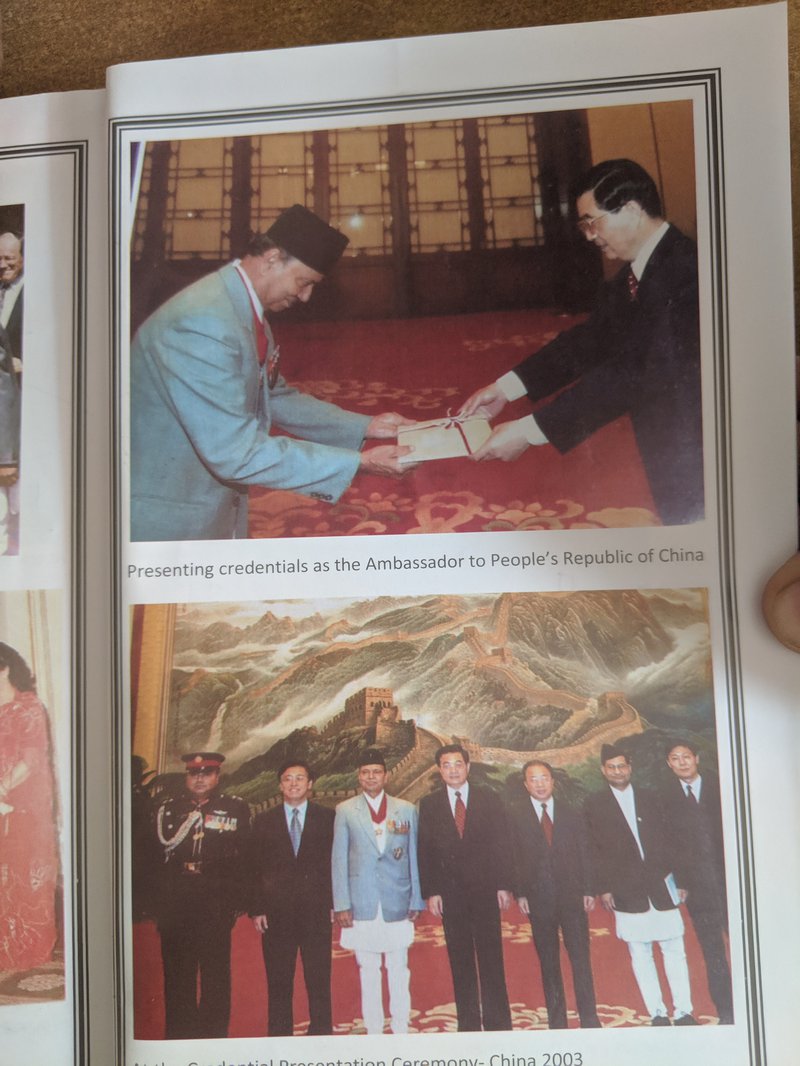
India has to take measures that will help her win the confidence of the Nepalese people.
There is a tendency in Nepal to compare Nepal’s relations with on neighbor as against with the other.
Paper writes anything. We should not conduct diplomacy through papers.
Being neighbors, things get exaggerated. Even small things are at time blown out of proportion.
Nepal China Relations
The Institution of Monarchy wants to see Nepal-China relations develop on a long term basis where political parties and leaders have a short term approach.
As a small country, what Nepal should be careful about in its dealing with other countries is that our loose talk or comments on sensitive issues do not create unnecessary uneasiness in our relationship. It is perhaps more true in our relations with China.
Nepal should always be alert as how the growing importance of China in the world affects her perception on Nepal.
Nepal has always appreciated China’s understanding of her relations, her independence and sovereignty.
Western countries are using Tibet and the Dalai Lama to create confusion in Nepal-China relations.
Nepal Japan Relations
Japan should help Nepal neutralizing the pressures from her neighbors, if she is to help he develop economically.
What are the prerequisites Nepal should fulfill to attract Japanese assistance in her economic development efforts.
It is interesting that what Nepal is going through currently (1990s) is similar to what Japan had to undergo at one time. If it was US in Japan’s case, it is India in Nepal’s.
Nepal Thailand Relations
Thailand is one of the countries that helped Nepal, a landlocked country, to open up.
Nepal-France Relations
Nepal has always appreciated France’s support for her identity and sovereignty.
Nepal Britain Relations
Nepal Britain Relations were established in battlefield and developed.
Nepal Israel Relations
In Nepal, there is a great deal of admiration for the way Israel has struggled for her identity and sovereignty. Nepal’s decision to have relations with Israel was guided by a principled stand.
South Asian Association for Regional Cooperation
Ten years is long enough a period for SAARC to evolve into a delivering mechanism form talking shop.
How serious are India and Pakistan in SAARC's neighborhood all having gone nuclear, how would this effect SAARC in short, medium and long term?
People have started questioning the output of SAARC.
More serious thought needs to be given to what the objectives of SAARC are to be, and secondly, what are the prerequisites in terms of structure, human and other resources to achieve those objectives. This has to be clear.
At SAARC Summits, Nepal always discouraged group meetings or meal engagements and insisted on either exclusively bilateral or with all seven attending for fear of being accused of groupism.
If all seven of SAARC have a common voice, it naturally carries more weight in the international arena.
The concept of SAARC was first broached by Nepal with Sri Lanka in 1980 during the state visit. Later, it was shared with Bangladesh. President Ziaur Rahaman agreed and wanted to Nepal take the lead which was politely declined. Instead Bangladesh was asked to initiate the matter with other South Asian leaders. India (Indira Gandhi) did not say 'no', while Zia ul Haq of Pakistan said if it was Nepal's idea, he would go for it. Nepal declined Bangladesh's offer to take the lead because she was interested in the end result and rather than on credit-taking. So, she preferred to act behind the scene.
When SARRC Was Established the objective was to afford the head of state or Government an opportunity for some form of interaction on a regular basis so that there was more rapport between them because historically we have had problems for lack of proper communication. This was the understanding.
Like all regional ventures, all the countries in SAARC must get rid of the historical legacies we have inherited.
SAARC is the outcome of the concern shown by all countries of the region for the betterment of the lives of their peoples.
Nonalignment
Questioning the validity of the Non-aligned Movement will continue.
At the beginning when there were two superpowers and decolonization was an issue, the Non-alignment Moment was a school of opinion, a pressure group or a lobby, which could consider specific issues, although not really able to achieve specific objectives.
Royal Nepal Army
Do you have an independent army commanded by your people? This was on of the questions the United Nations had asked Nepal to prove her sovereignty when she had applied for membership of the world body.
Whether one likes it or not, a martial nation like Nepal with the kind of geopolitics and open border cannot go the Costa Rican way.
The role that has been assigned to the Army is in the areas of environment, roads, relief and rescue works as well as politically supporting the system by giving into action when called.
Monarchy
On matters relating to the Institution of Monarchy or on issues of core national interest, it becomes the duty as well as the responsibility of the King to invoke the constitutional rule of being consulted especially when the matter is brought to attention.
Given the prevailing international situation and the internal bickering within among the parties why would the institution of monarchy be interested in going through the headache of interfering with the government's day to day work or trying to assert exercise power.
Monarchy does not play like a politicians.
Monarchy should avoid involving itself in matters related to political leaders and parties.
Nepal should be alert that there are constant attempts by foreigners as well as by some Nepalese to undermine Nepal's national institutions that can hold the nation together. Such institution include among others, the Monarchy, the Constitutional organs and the Royal Nepalese Army.
Monarchy -is-a threat syndrome still prevails at some level. This is the reason monarchy is holding back. it cannot come down this level politicians. it prefers to take its own time and let them get rid of this syndrome.
In multiparty dispensation, a monarchy cannot be anything but a constitutional monarchy. Else, it will be seen as taking sides among different schools of thought.
The Monarchy has to work with whoever is the prime minister. He represents the government. Monarchy has to back him.
Monarchy's interest is to see the multi-party democracy consolidated in its true sense. It is willing to play its role in a constructive manner in the process.
Monarchy's only interest is to safeguard nationality, sovereignty and to see the people happy with an improvements in the quality of their life.
Democracy
Nepal never had any problem with democracy. The way it is practiced may differ. Sometimes, it fits, but other times one many have to make adjustments. For instances, if you have copied the British system, it is a system where coalition government is almost unthinkable.
How to make everyone work within the norms of democracy is the difficult that Nepal is facing today.
In a multi-party democracy, you want to see an effective opposition in place. When you talk national government with no opposition, there will be no safety valve which may create many other problems.
What kind of democracy is it where so much emphasis is given to rights and nothing is mentioned about responsibilities?
It is said that democracy in Nepal is in infancy, but the truth is that it is the leaders who are behaving as infants.
Democracy, human rights and liberalization, which the West have emphasized are like body, mind and spirit (spiritual). A balance of the three is essential for smooth functioning. In Nepal's context, how is this balance maintained?
Politics
In politics, you say a lot of things but cannot deliver all. That is the problem with many developing countries. When the government gets embroiled in power struggle, staying in power becomes priority number one. In this situation, laws don't get enforced, nor are necessary laws enacted. Thus, a vacuum is created which may not remain vacuum for long because the extremists can come to fill in it.
Institutions are the pillar. If they area weakened, there may be serious consequences.
The constitutional organs are meant to provide a mechanism to check the Executive. But, the existing system of selecting the members of such organs and the rules and regulations governing them hindrances in enabling them to discharge their role freely and fearlessly.
In Nepal, even the Supreme Court is bogged down in a political issue.
Maoist
Using army to solve the Maoist problem is the last options. It means acceptance of defeat. If at all, Army is involved, it could go for logistic support which is essential to make the operation effective and that of only for a certain period of time. If one is to recognize that the Maoist problem is a security or political problem, then the Army is the wrong tool.
Both the Maoists and government or the political parties will try to involve the Institution of Monarchy in the Maoist problem. If the Maoist can drag the Monarchy in the front, they will think their objective achieved successfully. How to avoid or be spared of such a situation is a challenge.
To the Institution of Monarchy, a Maoist is first and foremost a Nepali, then only he is a Maoist. Same the case with other "ists".
If ISI can be accused of having links with the Maoists, there are indications that suggests the same about RAW.

Keshab Poudel
Poudel is the editor of New Spotlight Magazine.
- ECONOMY: Growth At 3.3
- Apr 16, 2024
- DPM’s SHRESTHA’S CHINA VISIT High Profile, Low Key
- Apr 14, 2024
- Maha Kumbha In Barahkshetra: A Sacred Festival In Sacred Koshi (Kaushiki) River
- Apr 09, 2024
- LOSS AND DAMAGE: Upper Tamakoshi A Case
- Apr 02, 2024
- Helvetas-Nepal’s InElam Promoting Herbal Oil In Sarlahi
- Mar 31, 2024






